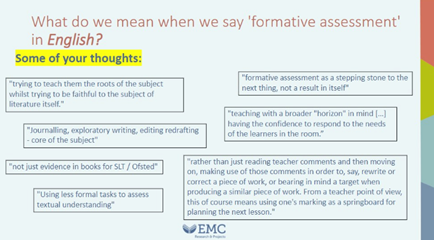We’re huge fans of grammar and grammar teaching at the English and Media Centre, believing firmly that it has an important role to play in helping young people to understand how language works and to develop their own writing. But our fandom comes with one important caveat: namely that teaching students a long list of grammar terminology out of context has no impact on the quality of their reading or writing.
And evidence for my claim? It is plentiful, it would seem. Myhill and Watson’s 2014 meta-analysis of research into grammar teaching over the past 50 years, 'The role of grammar in the writing curriculum: A review of the literature' found that “there is no evidence base to support [the] assertion that learning progresses chronologically from learning a grammatical concept to being able to apply it” (44).
This makes the ideology behind the government’s primary curriculum puzzling, especially given its commitment to ‘what works’ and ‘evidence-based learning’. And if anyone thinks I am being unduly harsh and that the primary landscape must be more nuanced than I am suggesting, here are the words relating to this point from the DfE’s English programmes of study for KS1 and 2:
… once pupils are familiar with a grammatical concept [for example ‘modal verb’], they should be encouraged to apply and explore this concept in the grammar of their own speech and writing and to note where it is used by others. (64)
The role of primary teachers is to stuff their young charges full of grammatical terminology, then we secondary teachers will reap the benefit when they actually use them.
Except I don’t think that we will. Yes, we will be confronted by massed ranks of Year 7s proudly telling us the difference between a transitive and an intransitive verb, or explaining how to spot an example of the subjunctive mood. But will they be better readers and writers? I sincerely hope that they will be, but the evidence suggests otherwise. Or, at least, the evidence suggests that the kind of grammatical knowledge that the National Curriculum encourages them to learn for their end of key stage 2 test will not make them better readers or writers. And logic dictates that if they are spending considerable amounts of time preparing for these tests by learning to distinguish between different forms of parentheses, or grappling for the umpteenth time with identifying a fronted adverbial, then they will have less time than in the past to focus on more fruitful pursuits – like reading and writing!
All, though, is not doom and gloom. For example, there is a deep understanding in many primary schools about what really matters when teaching young people to develop their language capabilities. This is exemplified superbly in the work of the Centre for Literacy in Primary Education (CLPE). They don’t shy away from the reality of schools being judged against the KS2 grammar test, but they show how knowledge about grammar can be taught in a contextualised way, so that it has a genuine impact on wider literacy skills.
And at secondary level, the logic of the curriculum means that teachers can cast aside the prescriptivism foisted upon primary colleagues, offering a descriptive approach instead: in other words, we can focus on the how of grammar rather than the what. In their final GCSEs, students will be rewarded for demonstrating the ability to choose wisely from the range of grammatical options at their disposal and for commenting on aspects of language as they see fit. They will not definitively have to identify the perfect aspect of a verb or demonstrate they can use a reflexive pronoun.
Does this mean that we should discard all the learning of linguistic terms that has gone on in primary schools? That would seem a waste. If students have a rich linguistic vocabulary then we should encourage them to use it where it is relevant. But we shouldn’t agonise over covering every term. If they don’t look at the subjunctive in your lessons, frankly who cares? Just so long as they are doing lots of great language rich work instead. And we shouldn’t go over the more significant terms endlessly. Instead, we should make them part and parcel of everyday classroom practice. Use them liberally and whenever possible as a matter of course, but don’t start every lesson asking for a particular definition or try to drum in what a progressive present or an adverbial phrase is with some decontextualised rote learning. The evidence says it won’t help to improve reading and writing. (And if you do want to remind students of the vocabulary available to them, then here’s a sheet that contains all the terms they cover at primary school, plus a few more.)
I haven’t, of course, directed you yet to any evidence that contextualised approaches to grammar learning, whatever they might be, do work. It exists, though. A body of knowledge is beginning to develop that suggests that teaching young people about the different grammatical choices that are available to them in their writing, and about when to be cautious and when to be experimental with these choices, can have an impact on their writing. In other words, the how of grammar trumps the what. A perfect starting point is the Myhill and Watson article which, towards, the end, directs you to several sources (53-54).




